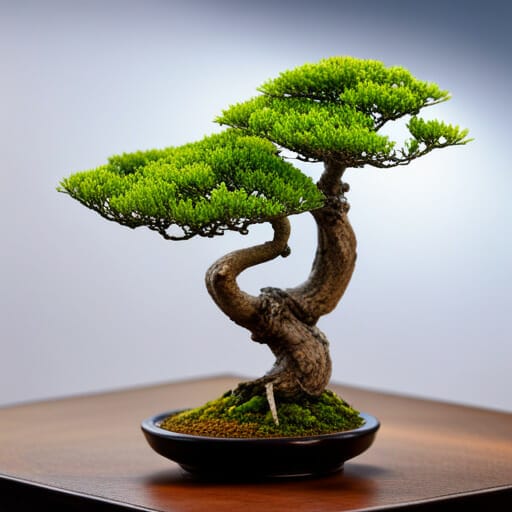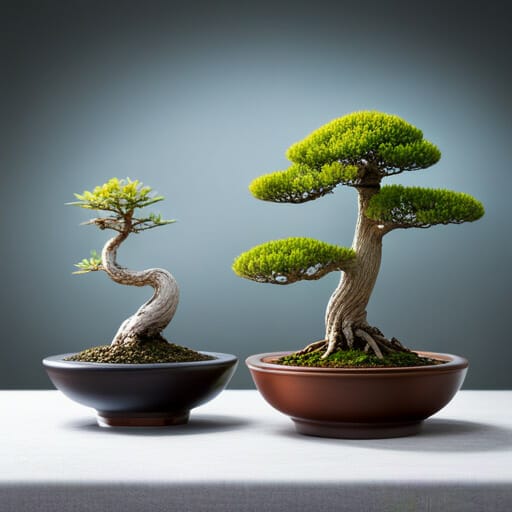Mini bonsai trees are like timeless works of art, captivating and enchanting with their miniature size and intricate beauty. These tiny marvels have the potential to live for more than a century if nurtured with care and expertise.
The journey of their longevity is a fascinating one, filled with secrets waiting to be uncovered. In this article, we will delve into the hidden world of mini bonsai trees, exploring the factors that affect their lifespan and comparing them to their larger counterparts.
Through this exploration, we aim to provide valuable insights and knowledge to those who desire to serve these delicate living beings. By understanding the proper care and maintenance required, we can unlock the secrets that allow these mini bonsai trees to flourish, ensuring their graceful existence for generations to come.
Contents
Quick Points
- Mini bonsai trees have the potential to live for more than 100 years if properly cared for and maintained.
- Coniferous trees tend to live longer than deciduous and flower trees.
- The size of mini bonsai trees must be controlled to prevent them from outgrowing their intended dimensions.
– Providing the right environment, including lighting, watering, and fertilization, is crucial for the longevity of mini bonsai trees.
How Long Can They Live?

The longevity of mini bonsai trees can vary, with some specimens living more than 100 years, while the average age is typically around 50 to 60 years; however, no specific records exist regarding the exact lifespan of these trees.
Mini bonsai trees require proper care and maintenance to reach their potential lifespan. One of the main challenges with mini bonsai trees is keeping their miniature size below 8 inches. If not carefully maintained, they can outgrow their intended size and may not live as long.
It is worth noting that coniferous trees tend to live longer than deciduous and flower trees.
The oldest mini bonsai trees in Akiko Matsudaira’s collection are around 120 years old, demonstrating that with the right care, these trees can live for a significant amount of time.
Factors Affecting Lifespan

Factors such as proper care and maintenance, tree type, and size control play significant roles in determining the lifespan of these captivating miniature living artworks.
To ensure the longevity of mini bonsai trees, it is essential to provide them with the right environment, including appropriate lighting, watering, and fertilization. Regular pruning and shaping are also crucial to maintain their desired size and form.
Additionally, the type of tree can affect its lifespan, with coniferous trees generally living longer than deciduous or flowering trees.
Moreover, controlling the size of mini bonsai trees is essential to prevent them from outgrowing their intended dimensions.
By carefully considering these factors and providing the necessary care, mini bonsai trees can thrive and potentially live for many years, delighting both their owners and those who appreciate their beauty.
Comparison with Normal Bonsai

When comparing mini bonsai trees to their normal bonsai counterparts, it is evident that both types can live for an extended period of time with proper care and maintenance.
Normal bonsai trees have been known to live for hundreds of years, with the oldest bonsai tree in Japan being a 1000-year-old spruce. Similarly, mini bonsai trees have the potential to live for more than 100 years if they receive the necessary care. However, it is important to note that the lifespan of mini bonsai trees is typically around 50 to 60 years.
The difficulty lies in keeping them at their miniature size, as they can outgrow their intended size if not carefully maintained. It is interesting to observe that coniferous trees tend to live longer, but the oldest mini bonsai trees in Akiko Matsudaira’s collection include both deciduous and flower trees.
Frequently Asked Questions
What is the average size of a mini bonsai tree?
The average size of a mini bonsai tree is typically below 8 inches. Careful maintenance is required to keep them within this size range, as they can outgrow their intended size if not properly maintained.
Can mini bonsai trees be grown indoors?
Mini bonsai trees can be grown indoors, providing a captivating experience for enthusiasts. With proper care, they can thrive in an indoor environment, making them a convenient and accessible option for those who desire to cultivate these unique and beautiful plants.
How often should mini bonsai trees be watered?
Mini bonsai trees should be watered regularly, but the frequency depends on factors such as the tree’s size, soil type, and environmental conditions. It is recommended to check the moisture level of the soil before watering to avoid over or under watering.
Are there any specific pruning techniques for mini bonsai trees?
Pruning techniques for mini bonsai trees are essential for maintaining their miniature size. Careful and precise pruning helps control growth and shape, ensuring they remain below 8 inches. This practice requires expertise and attention to detail.
Can mini bonsai trees be propagated or grown from seeds?
Yes, mini bonsai trees can be propagated and grown from seeds. This process involves carefully collecting and preparing the seeds, providing the necessary conditions for germination, and nurturing the young seedlings until they reach the desired size.




